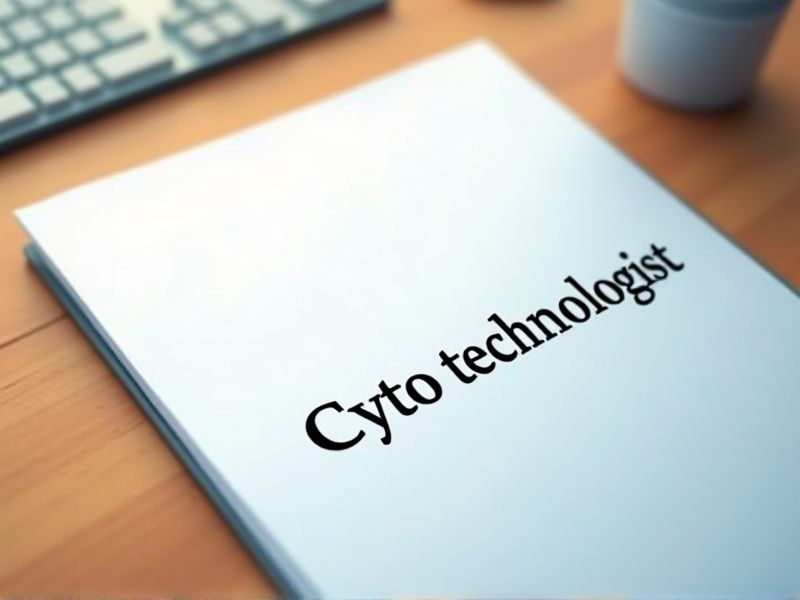
Cytotechnologists play a critical role in diagnosing cellular anomalies, directly impacting patient outcomes. Due to the complexity and precision required in analyzing cell samples, specialized certifications ensure they possess the necessary expertise and skills. Certifications also enhance credibility and can broaden professional opportunities within the healthcare industry. Notable certifications that might be required for cytotechnologists include...
ASCP Certification in Cytotechnology
The ASCP Certification in Cytotechnology is essential for ensuring that cytotechnologists possess the necessary skills and knowledge to accurately screen and evaluate cellular samples. Holding this certification enhances professional credibility and increases job opportunities in medical and diagnostic laboratories. The certification process involves rigorous assessments, which are designed to benchmark against industry standards and maintain quality in diagnostic practices. Obtaining this certification often leads to better career advancement and salary prospects due to recognized professional competence.
ASCP Board of Certification in Cytology
The ASCP Board of Certification in Cytology is necessary for cytotechnologists because it establishes and verifies the professional competence needed to accurately assess cellular samples. Having this certification increases the credibility and trust in a cytotechnologist's skills among employers and patients as it ensures adherence to industry standards. The certification also demands ongoing professional development, which aligns with advancements in medical technology and research, ensuring that cytotechnologists remain at the forefront of their field. Without such a certification, the likelihood of diagnostic errors or outdated practices would increase, adversely affecting patient outcomes and healthcare quality.
ASCP Certification in Histotechnology
ASCP certification in Histotechnology enhances a cytotechnologist's understanding of tissue preparation, which is critical for accurate cytological analysis. This certification provides comprehensive knowledge about histological techniques, directly improving diagnostic precision when evaluating cell samples. By obtaining ASCP certification, cytotechnologists gain recognition for their expertise, leading to better career advancement opportunities within laboratory settings. The certification ensures that professionals meet standardized competencies, which is crucial for maintaining quality control and safety in pathology labs.
Medical Laboratory Technician (MLT) Certification
Medical Laboratory Technician (MLT) certification provides a foundational understanding of laboratory protocols, crucial for a cytotechnologist who needs to handle complex specimens. It ensures that cytotechnologists are proficient in standard laboratory practices, enhancing diagnostic accuracy by reducing procedural errors. Certification elevates professional credibility, attracting better career opportunities and trust from employers and patients alike. MLT certification aligns with regulatory standards, ensuring compliance with healthcare laws and guidelines, which is critical for maintaining public safety.
Clinical Laboratory Improvement Amendments (CLIA) Certification
Clinical Laboratory Improvement Amendments (CLIA) certification is necessary for cytotechnologists to ensure tests are of high quality and reliable, which directly impacts patient care accuracy. Without CLIA certification, laboratories might compromise on standards, leading to diagnostic errors and inadequate treatment plans. The certification mandates regular proficiency testing and adherence to federal guidelines, maintaining national consistency across laboratories. It also boosts public confidence in laboratory services, assuring patients that their samples are processed under rigorous standards.
Cytopathology Laboratory Quality Assurance Certification
Cytopathology Laboratory Quality Assurance Certification ensures accuracy and reliability in test results, enhancing patient care by reducing diagnostic errors. This certification standardizes protocols, which leads to improved workflow efficiency and better resource management for cytotechnologists. It instills confidence among healthcare providers and patients, increasing trust in laboratory results. Enhanced professional credibility often follows certification, providing cytotechnologists with more opportunities for career advancement.
Infection Control Certification (CIC)
The Infection Control Certification (CIC) enhances a cytotechnologist's competence in preventing and managing infections in lab environments. As cytotechnologists often work with potentially infectious specimens, CIC ensures they apply best practices to minimize contamination risks. Hospitals and clinics prioritize infection prevention, making CIC a valuable credential for ensuring compliance with safety standards. The presence of CIC in a cytotechnologist's qualifications often leads to improved job prospects and career advancement due to the focus on patient and staff safety.
HIPAA Compliance Certification
Cytotechnologists regularly handle sensitive patient health information, necessitating adherence to HIPAA requirements to ensure data protection and privacy. Compliance certification demonstrates a commitment to maintaining confidentiality and builds trust with patients and healthcare providers. A certification helps cytotechnologists understand regulatory guidelines and avoid potential legal and financial penalties associated with data breaches. Organizations employing certified cytotechnologists can mitigate risks related to non-compliance, fostering a secure healthcare environment.
Molecular Diagnostics Certification
Molecular diagnostics certification enhances a cytotechnologist's ability to accurately interpret complex cellular data, which is crucial for early and precise disease detection. The certification aligns with the growing integration of molecular techniques in cytology, expanding the scope of practice for cytotechnologists. Certified professionals are more competitive in the job market as healthcare increasingly relies on molecular diagnostics for personalized medicine approaches. With certification, cytotechnologists can ensure compliance with the latest industry standards, thereby improving patient outcomes through more informed diagnostic processes.
Certified Professional in Healthcare Quality (CPHQ)
The Certified Professional in Healthcare Quality (CPHQ) credential equips cytotechnologists with enhanced understanding of healthcare quality management, crucial for ensuring accurate diagnosis and patient safety. This certification helps cytotechnologists keep pace with evolving quality standards and regulatory requirements in the healthcare sector. Having a CPHQ credential may improve career prospects, as employers often value professionals who demonstrate commitment to quality improvement. In a multidisciplinary healthcare setting, a CPHQ-certified cytotechnologist can effectively collaborate to optimize processes and healthcare outcomes.
Summary
When you, as a cytotechnologist, obtain additional certifications, your expertise in cellular analysis increases. This specialization often leads to enhanced job opportunities and potential salary boosts. Certifications can also build your credibility within the medical community, increasing trust in your diagnostic abilities. Employers tend to favor candidates with advanced credentials, providing you with a competitive edge in the job market.
